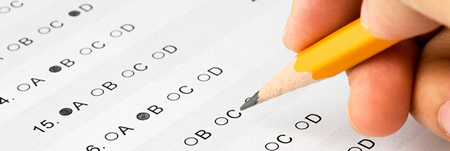- Part 1 What's important about tests?
- Part 2 Analysing the results of the Bohunt tests
Part 1
 What's important about tests?
What's important about tests?
The whole of the month-long experiment which is ‘Chinese School’ is leading up to the tests given at the end. The tests are being used to compare the 50 Year 9 students in Chinese School with the much larger Year 9 group of 239 students being taught by their regular Bohunt School teachers. The stakes are high. Competition, winning, losing, doing better are all part of the vocabulary of the series – and the pressure is coming from the head teacher Neil Strowger who in Episode 1 says that he is confident that his colleagues will win in the battle of the teachers.
So in general what do tests tell us? What kinds of comparisons can be made through tests? How sure can we be that tests are making fair comparisons? And what does it mean to ‘win’ or ‘lose’ on a test?
Comparisons
In Britain we’re used to testing in schools. SATS, GCSEs, A Levels, Scottish Advanced Highers: we think they’re important. There’s regular talk in the media of the pressure on young people, of needing extra tuition to do well. How well we do on an important exam is so often key to what we can do next. Tests show that we’ve reached a certain level; they show that we’re good or not so good. And there is often competition to what we can do next, so we need to show that we’re better than the person sitting next to us, or the rest of the class.
For tests to work as qualifications there needs to be confidence that they are fair tests of the whole group taking them, and that they are appropriate to the subject being tested. That’s not always the case. In 2008, Key Stage 3 SATS for Year 9 were abolished, among other reasons, because of concerns over the marking system. In 2015 the Scottish Qualificiations Authority has admitted the new Higher Maths exam ‘was too hard’ . Tests need to be comparable, there has to be confidence that every person getting say, an A* at GCSE has reached the same threshold. We know that that’s not as straightforward as it sounds. Every year in August, there’s debate around the standards of this year’s A Levels compared with 10 or 20 years ago; every September in schools there’s debate among teachers about whether one Exam Board’s GCSE syllabus is ‘more difficult’ than another’s, or whether an alternative version of the exam might be ‘easier’.
International comparisons
International comparisons are a major concern for governments worried about economic competitiveness and future productivity. Perhaps for many parents in Britain today it’s not as important whether the UK is doing ‘better’ than the USA or Germany or China – but the landscape is starting to change. 18 year olds with UK qualifications can go to university in Europe - it can be significantly cheaper. Or they can go to the USA - it might be much easier to get a scholarship. In today’s increasingly global world then international comparisons of tests are becoming more important to parents and young people – as well as governments.
One of the ideas put forward in the series is that school students in Britain are ‘3 years behind’ China, particularly in maths. What does this mean? What is it based on? How helpful is it? International comparisons based on tests have to be treated with care. In the November 2013 PISA International tests taken by 15-year olds, Shanghai in China topped the table and Hong Kong came third. However, Shanghai and Hong Kong are affluent cities and make up only a small proportion of China’s population. Are they representative of secondary schooling in China as a whole? Does a test result like that really mean that all UK schools are 3 years behind all schools in China?
What can’t tests do?
A criticism of tests is that they only easily test what is easy to measure. Comparisons are much more straightforward if numbers are involved. But is it easy to measure what young people need to be able to do to move on in their life and their careers? Business and industry are often questioning whether what is taught in schools is the best preparation for a working life. How do you test creativity? team work? motivation? ethical behaviour? citizenship? responsibility? Ironically, while the UK is looking eastwards, China is looking to the west – and turning to British-style education because Chinese parents find it more creative.
Part 2, to be posted after Episode 3 of the series is shown, looks in detail at the results of the tests which were taken by Year 9 at Bohunt School to see if more can be learned than who ‘won’ and who ‘lost’.
Rate and Review
Rate this article
Review this article
Log into OpenLearn to leave reviews and join in the conversation.
Article reviews